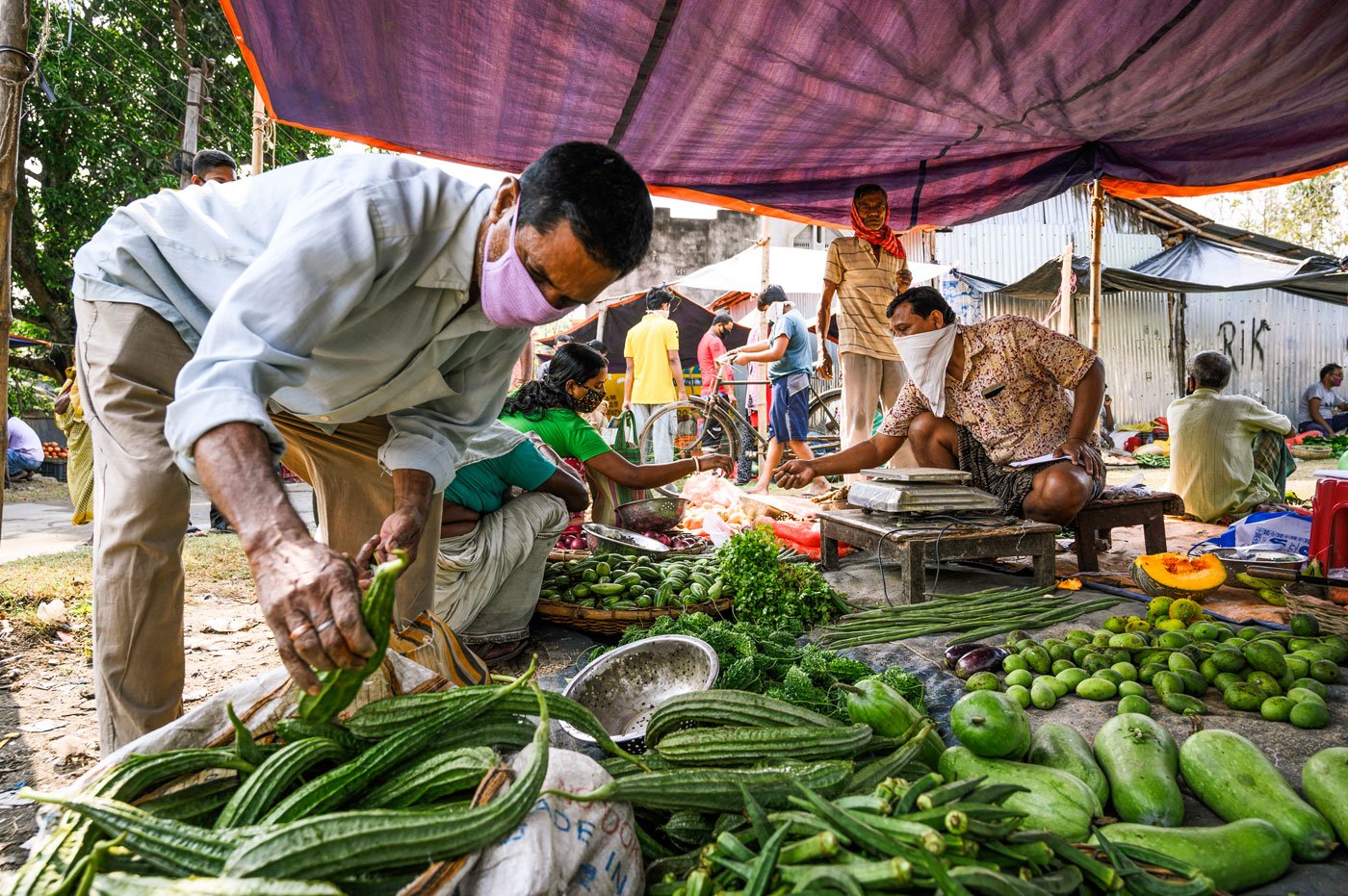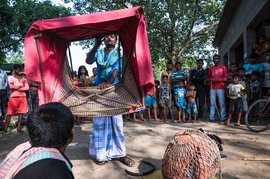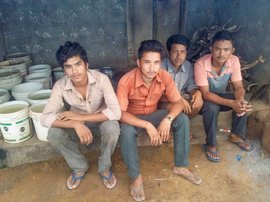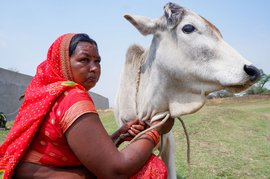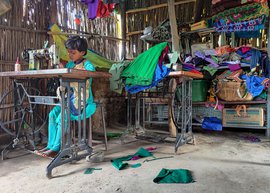کووڈ-۱۹ لاک ڈاؤن کے سبب مغربی بنگال کے ندیا ضلع میں تیہٹہ گاؤں کے چتور پاڑہ کی مستقل سبزی منڈی کو بند کر دیا گیا تھا، جس کے بعد وہاں کے لوگوں نے اس گاؤں کے دتہ پاڑہ علاقے میں، ایک کھلے میدان میں عارضی بازار بنا لیا ہے، جو صبح ۶ بجے سے ۱۰ بجے تک کھلا رہتا ہے۔ تیہٹہ بلاک ۱ میں واقع اس گاؤں کو مغربی بنگال حکومت کے ذریعے اپریل میں ’ہاٹ اسپاٹ‘ قرار دے دیا گیا تھا۔ بازار کے دن کی کچھ تصویریں:
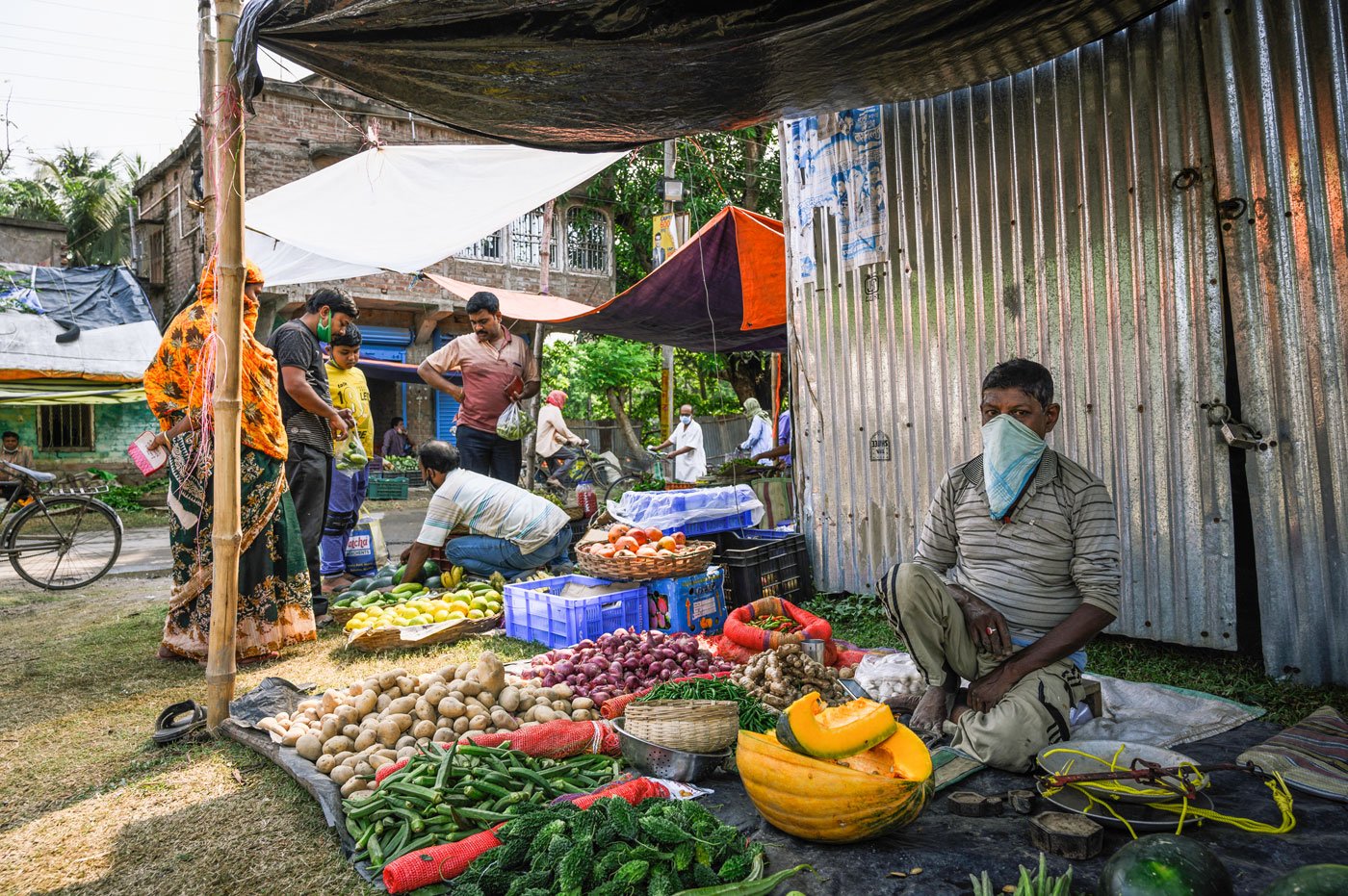
۴۸ سالہ پروشانتو مونڈل صبح میں دال پوڑی اور شام کو آلو بونڈا بیچتے تھے۔ لیکن لاک ڈاؤن میں پکے ہوئے اسٹریٹ فوڈ پر پابندی لگ جانے کے سبب، انہوں نے سبزیاں بیچنی شروع کر دیں۔ پہلے جہاں وہ روزانہ ۴۰۰ روپے کمایا کرتے تھے، آج وہ آمدنی گھٹ کر مشکل سے ۱۵۰ روپے رہ گئی ہے۔ ’’میں سبزی کے کاروبار سے بہت زیادہ شناسا نہیں ہوں،‘‘ وہ کہتے ہیں۔
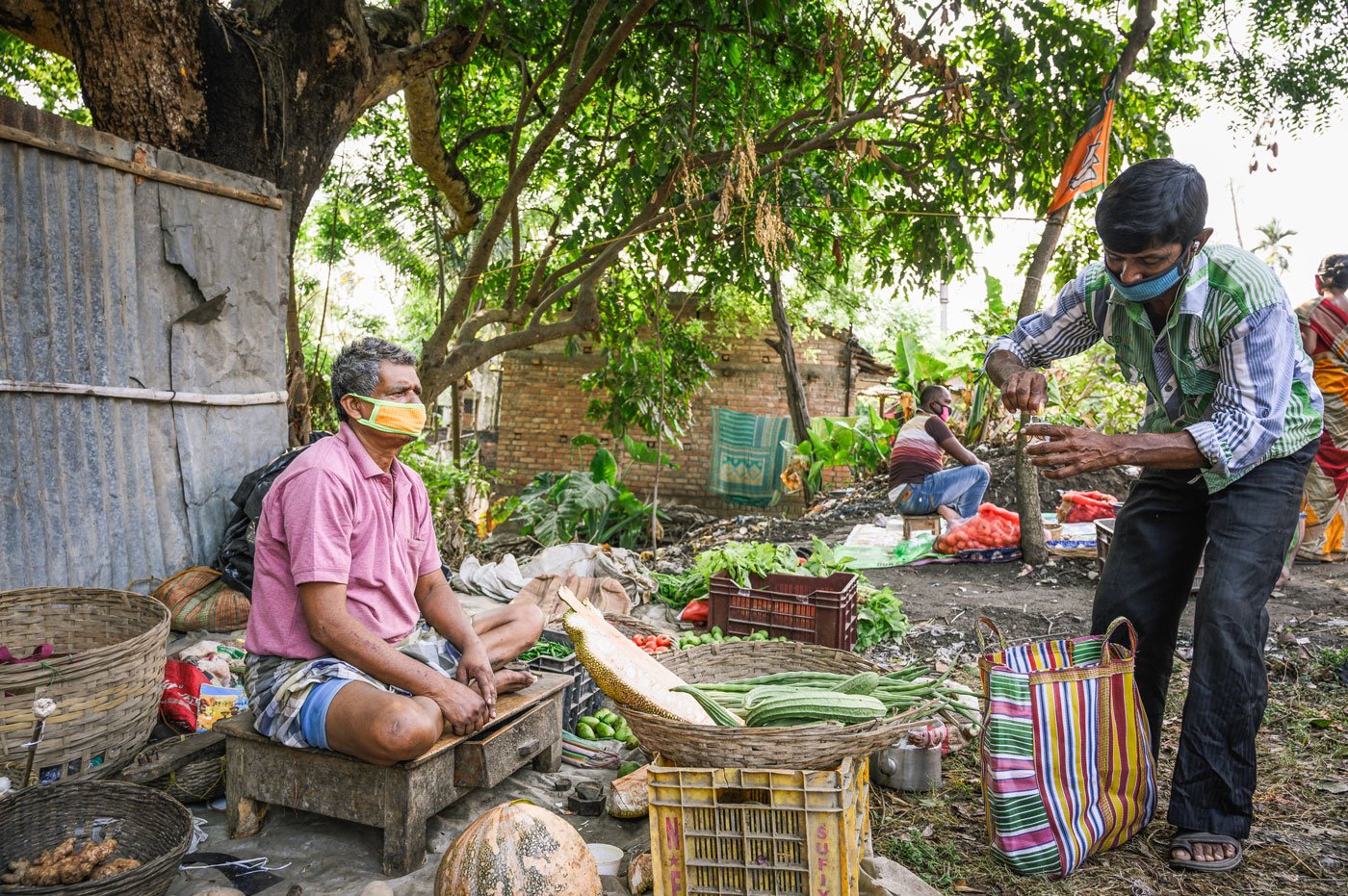
۵۶ سالہ سبزی فروش رام دتہ، شانتی ہلدر سے لیموں کی چائے خرید رہے ہیں۔ ان کی آمدنی پہلے ۳۰۰ روپے یومیہ ہوا کرتی تھی، جو اب گھٹ کر آدھی رہ گئی ہے۔ وہ کہتے ہیں، ’’پہلے میری سبزیاں بہت زیادہ فروخت نہیں ہوتی تھیں، اب حالت مزید خراب ہے۔‘‘ ۴۸ سالہ شانتی ہلدر ۲۰ سال سے جھال موڑھی (مغربی بنگال کا ایک مقبول اسٹریٹ فوڈ) بیچ رہے تھے، لیکن لاک ڈاؤن میں پکے ہوئے اسٹریٹ فوڈ پر پابندی لگ جانے کے سبب، وہ چائے بیچ رہے ہیں۔ ان کی آمدنی بھی ۲۵۰-۳۰۰ روپے سے گھٹ کر ۱۰۰-۱۲۰ روپے یومیہ رہ گئی ہے۔
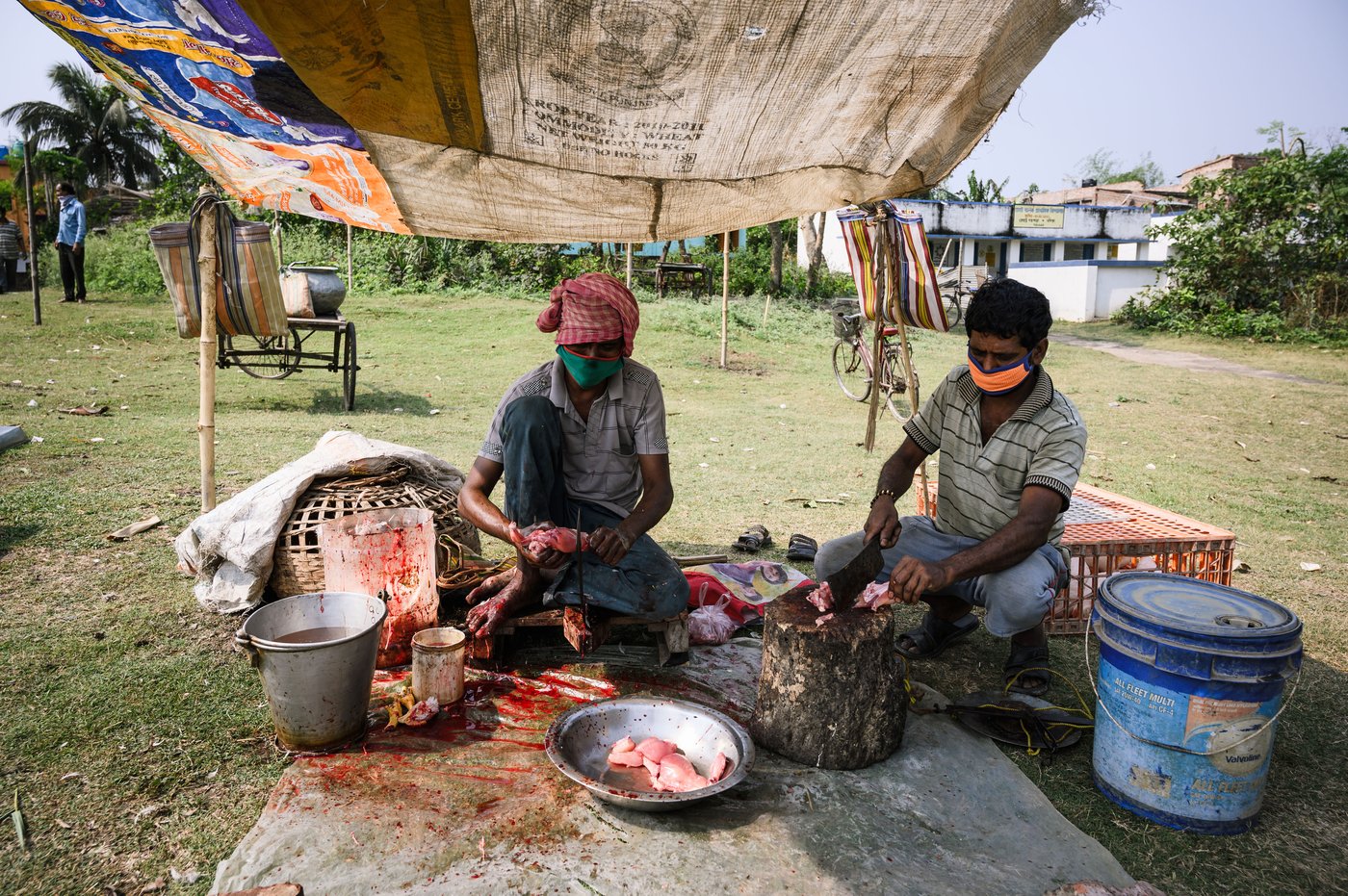
سکھین (بائیں) اور پروسین جیت ہلدر (دائیں) آپس میں بھائی ہیں۔ سکھین ایک ریستراں میں کھانا بناتے تھے اور ۱۰ ہزار روپے ماہانہ تنخواہ پاتے تھے، لیکن اب مشکل سے ایک دن میں ۲۰۰ روپے کماتے ہیں – اور وہ بھی غیر یقینی ہے۔ پروسین جیت ماہی پروری کے تالاب میں اور راج مستری کے عارضی ہیلپر کے طور پر کام کیا کرتے تھے۔ ان کی کمائی بہت معمولی تھی – دونوں ذرائع سے تقریباً ۲۵۰ روپے روزانہ – لیکن وہ ماہی پروری کے تالاب سے کچھ مچھلی گھر لے آتے تھے۔ لاک ڈاؤن کے دوران اب وہ بھی بند ہو گیا ہے۔
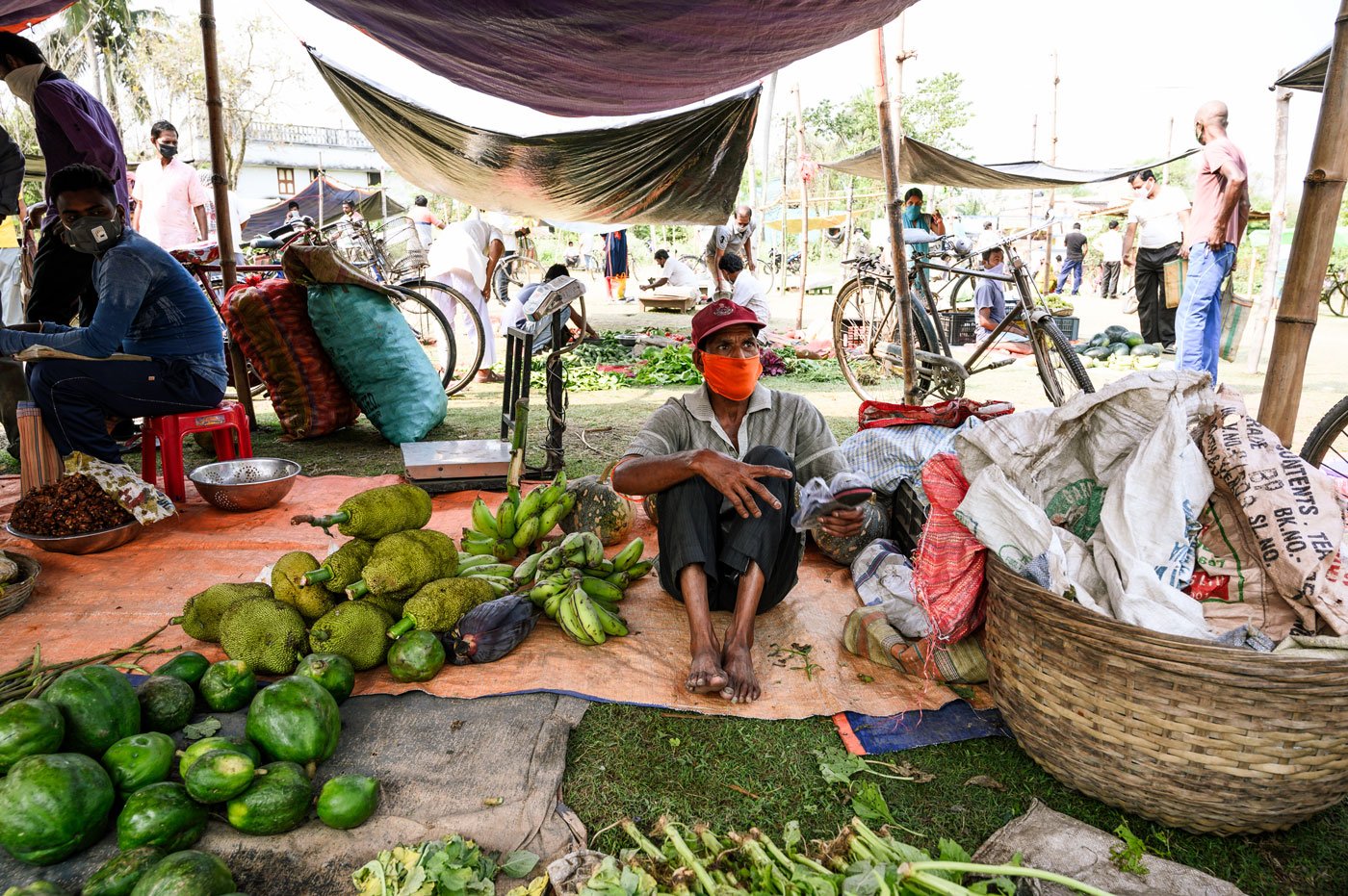
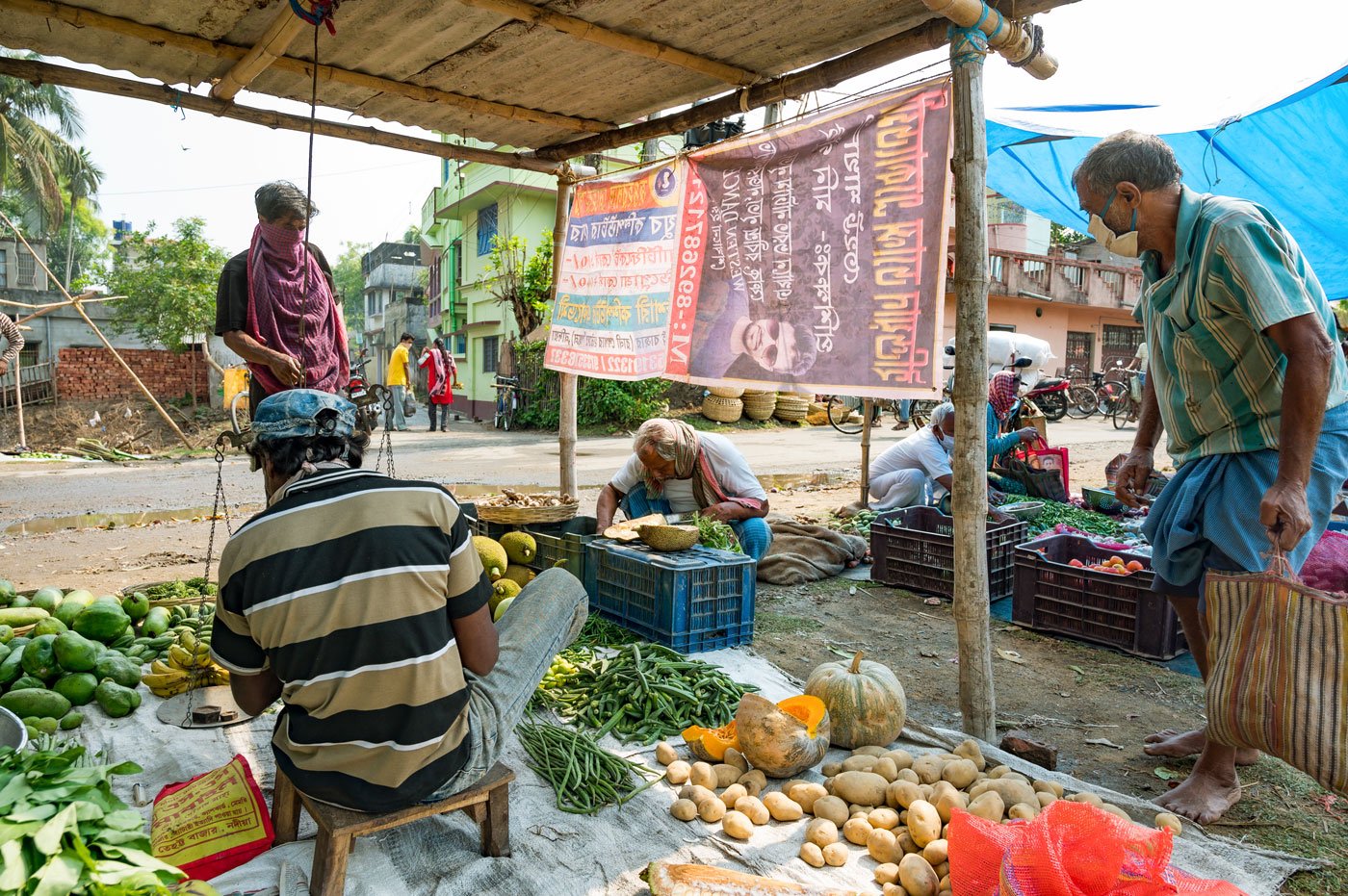
بائیں: ۴۷ سالہ پرفل دیب ناتھ، ۲۳ سال سے سمبے کرشی اُنَّین سمیتی مارکیٹ (اب لاک ڈاؤن کے سبب بند ہے) میں چھوٹے موٹے کام کرتے رہے ہیں۔ وہ گاہکوں کے گھروں تک پہنچائی جانے والی بوریاں لاتے ہیں، اور گاڑیوں سے سامان اتار کر دکانوں میں پہنچاتے ہیں۔ اور وہ پورے بازار میں جھاڑو لگاتے ہیں – بدلے میں ہر ایک سبزی فروش سے روزانہ ۲ روپے اور دیگر دکانداروں سے ۱ روپیہ لیتے ہیں۔ لیکن اب، چونکہ بازار دتہ پاڑہ میں منتقل ہو گیا ہے، ان کی معمولی کمائی بھی آدھی رہ گئی ہے، حالانکہ کچھ سبزی فروش دیب ناتھ کے لیے ناشتہ اور دوپہر کے کھانے کا انتظام کر دیتے ہیں۔ ’’اگر میں صفائی نہ کروں، تو بازار گندا رہے گا،‘‘ وہ کہتے ہیں۔ ’’اگر میں بازار کی صفائی کروں گا تو سبھی لوگ میرا نام جان جائیں گے۔ کوئی بھی میری طرح کام نہیں کرے گا!‘‘ دائیں: چونکہ بازار کچھ گھنٹوں کے لیے ہی کھلتا ہے، اس لیے کئی لوگ قیمتیں کم ہونے کی امید میں آخری وقت میں خریداری کرتے ہیں۔ ۵۰ سالہ کھوکا رائے ایک بڑھئی تھے، پھر انہوں نے گھر سے ایک چھوٹی سی کیرانے کی دکان چلائی، اور اب لاک ڈاؤن کے سبب بازار میں سامان بیچ رہے ہیں۔ ان کی یومیہ آمدنی ۴۰۰-۵۰۰ روپے سے گھٹ کر اب صرف ۲۰۰-۲۵۰ روپے رہ گئی ہے۔ ’’پولس گشت لگا رہی ہے، اس لیے لوگ اپنے گھروں سے نہیں نکل رہے ہیں،‘‘ وہ کہتے ہیں، ’’آپ ہی بتائیے، ہم سبزیاں کیسے بیچ سکتے ہیں؟‘‘
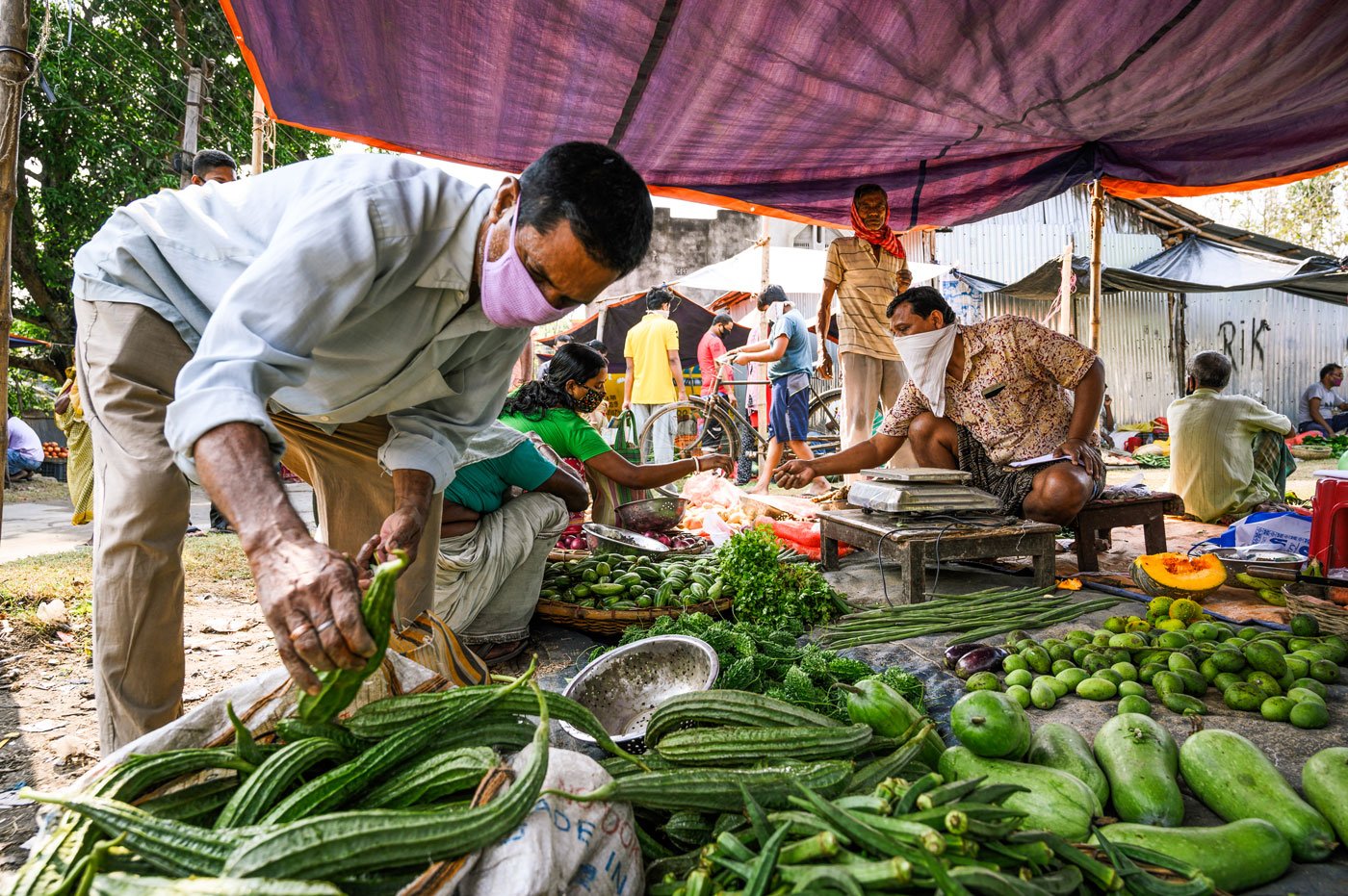
پریمل دلال کے اسٹال سے سبزی اٹھاتے گاہک۔ ۳۰ سال سے یہ کام کر رہے ۵۱ سالہ پریمل، دوسروں کے مقابلے زیادہ خود اعتمادی سے بھرے ہوئے ہیں، اور کہتے ہیں، ’’میرے کاروبار میں زیادہ تبدیلی نہیں ہوئی ہے۔ میں جن گاہکوں کو جانتا ہوں، وہ یہاں بھی آ رہے ہیں۔‘‘
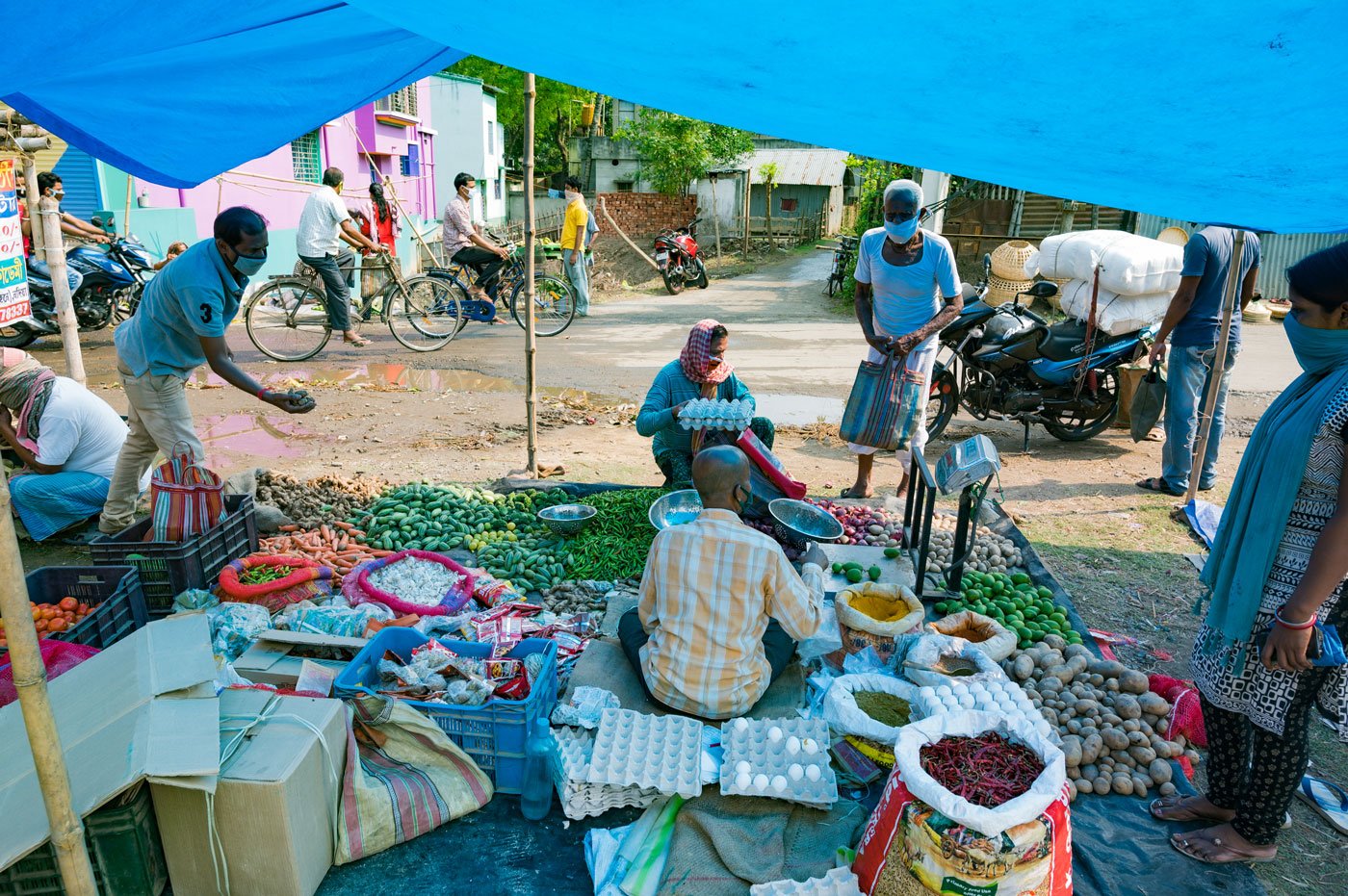
کارتک دیب ناتھ انڈے، ادرک، پیاز، مرچ، لہسن، اور دیگر سبزیاں بیچتے ہیں۔ وہ ۴۷ سال کے ہیں، اور تین دہائیوں سے یہ کام کر رہے ہیں۔ ’’میرا کاروبار اچھا چل رہا ہے،‘‘ وہ کہتے ہیں، ’’اور کچھ نئے خریدار بھی جڑ گئے ہیں۔‘‘
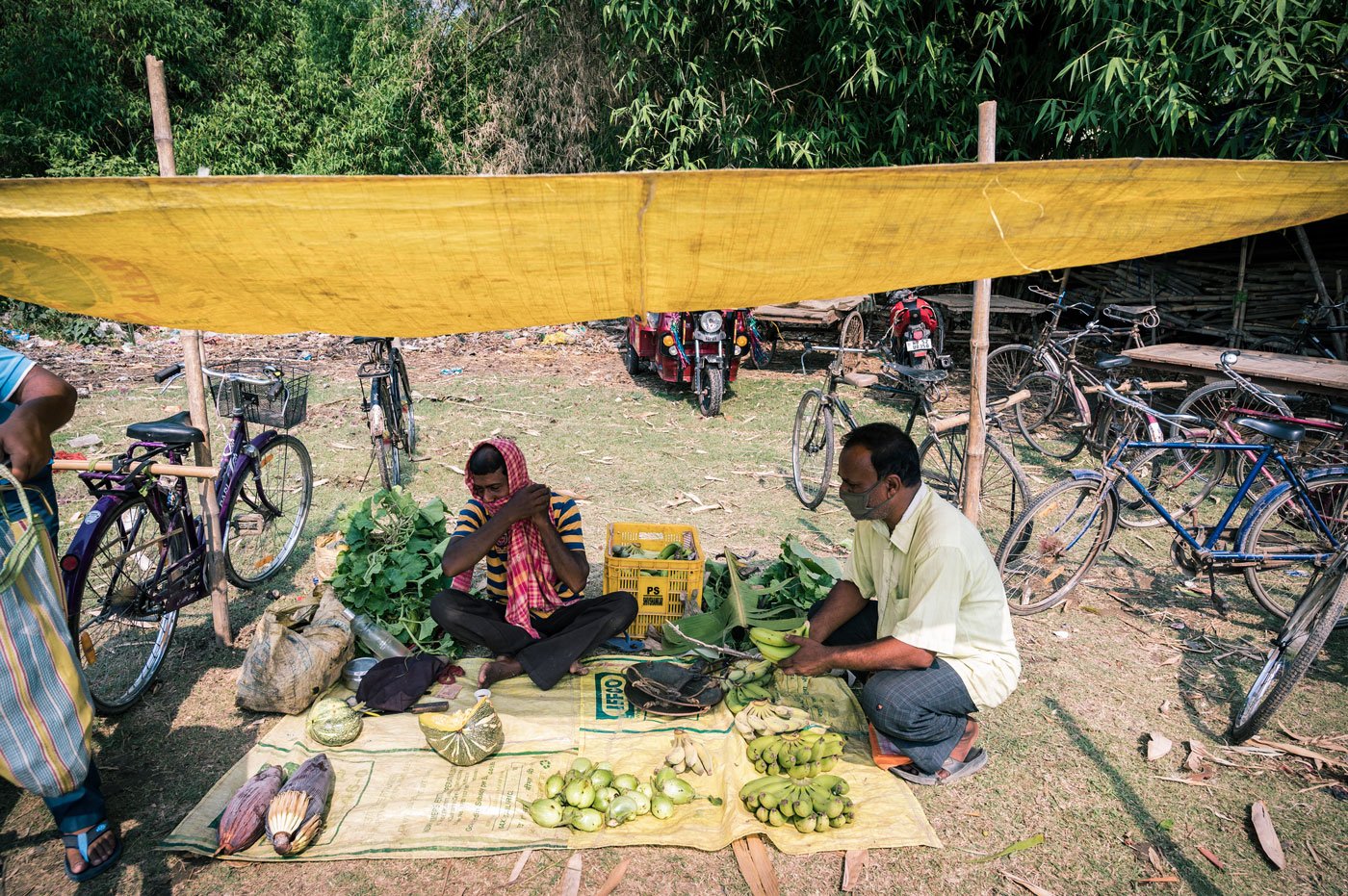
کئی لوگ کام چلاؤ ماسک کا استعمال کر رہے ہیں، جیسے کہ ۳۷ سالہ کسان اور عارضی سبزی فروش ببلو شیخ اپنا رومال استعمال کر رہے ہیں۔
![Left: Khakon Pramanick, 45, who sells chickens and sometimes migrates to other states to work at construction sites, is now struggling with a drop from both sources of income. Right: Bharat Halder, 62, was a mason’s helper before he started selling fish around three years ago, hoping to earn more. During the lockdown, his earnings have dropped from around Rs. 250 a day to less that Rs. 200, he says. The supply of fish is also uncertain. “Fish is no longer coming from Andhra Pradesh due to the lockdown,” he says. “So the local pond and river fish [in smaller quantities] are now sold here.”](/media/images/09a-_DSC0045.max-1400x1120.jpg)
![Left: Khakon Pramanick, 45, who sells chickens and sometimes migrates to other states to work at construction sites, is now struggling with a drop from both sources of income. Right: Bharat Halder, 62, was a mason’s helper before he started selling fish around three years ago, hoping to earn more. During the lockdown, his earnings have dropped from around Rs. 250 a day to less that Rs. 200, he says. The supply of fish is also uncertain. “Fish is no longer coming from Andhra Pradesh due to the lockdown,” he says. “So the local pond and river fish [in smaller quantities] are now sold here.”](/media/images/09b-_DSC9999-2.max-1400x1120.jpg)
بائیں: ۴۵ سالہ کھاکون پرمانک، جو مرغیاں بیچتے ہیں اور کبھی کبھی تعمیراتی مقامات پر کام کرنے کے لیے دوسری ریاستوں میں چلے جاتے ہیں، اب دونوں ذرائع سے ہونے والی آمدنی کے کم ہو جانے سے جدوجہد کر رہے ہیں۔ دائیں: ۶۲ سالہ بھرت ہلدر راج مستری کے معاون ہوا کرتے تھے، لیکن زیادہ کمائی کی امید میں تین سال پہلے انہوں نے مچھلیاں بیچنی شروع کر دیں۔ وہ بتاتے ہیں کہ لاک ڈاؤن کے دوران ان کی کمائی ۲۵۰ روپے سے گھٹ کر ۲۰۰ روپے یومیہ رہ گئی ہے۔ مچھلی کی سپلائی کے بارے میں بھی یقین سے نہیں کہا جا سکتا۔ ’’لاک ڈاؤن کے سبب آندھرا پردیش سے مچھلی نہیں آ رہی ہے،‘‘ وہ بتاتے ہیں۔ ’’اس لیے اب یہاں مقامی تالاب اور ندی کی مچھلیاں [کم مقدار میں] فروخت ہو رہی ہیں۔‘‘
![Sridam Mondal, 62, mainly sells bananas and, at times, also a few vegetables. “The sales are very low [during the lockdown],” he says.](/media/images/10-_DSC9985.max-1400x1120.jpg)
۶۲ سالہ شری دم مونڈل، بنیادی طور پر کیلے اور کبھی کبھی سبزیاں بھی بیچتے ہیں۔ ’’[لاک ڈاؤن کے دوران] فروخت کم ہو رہی ہے،‘‘ وہ کہتے ہیں۔
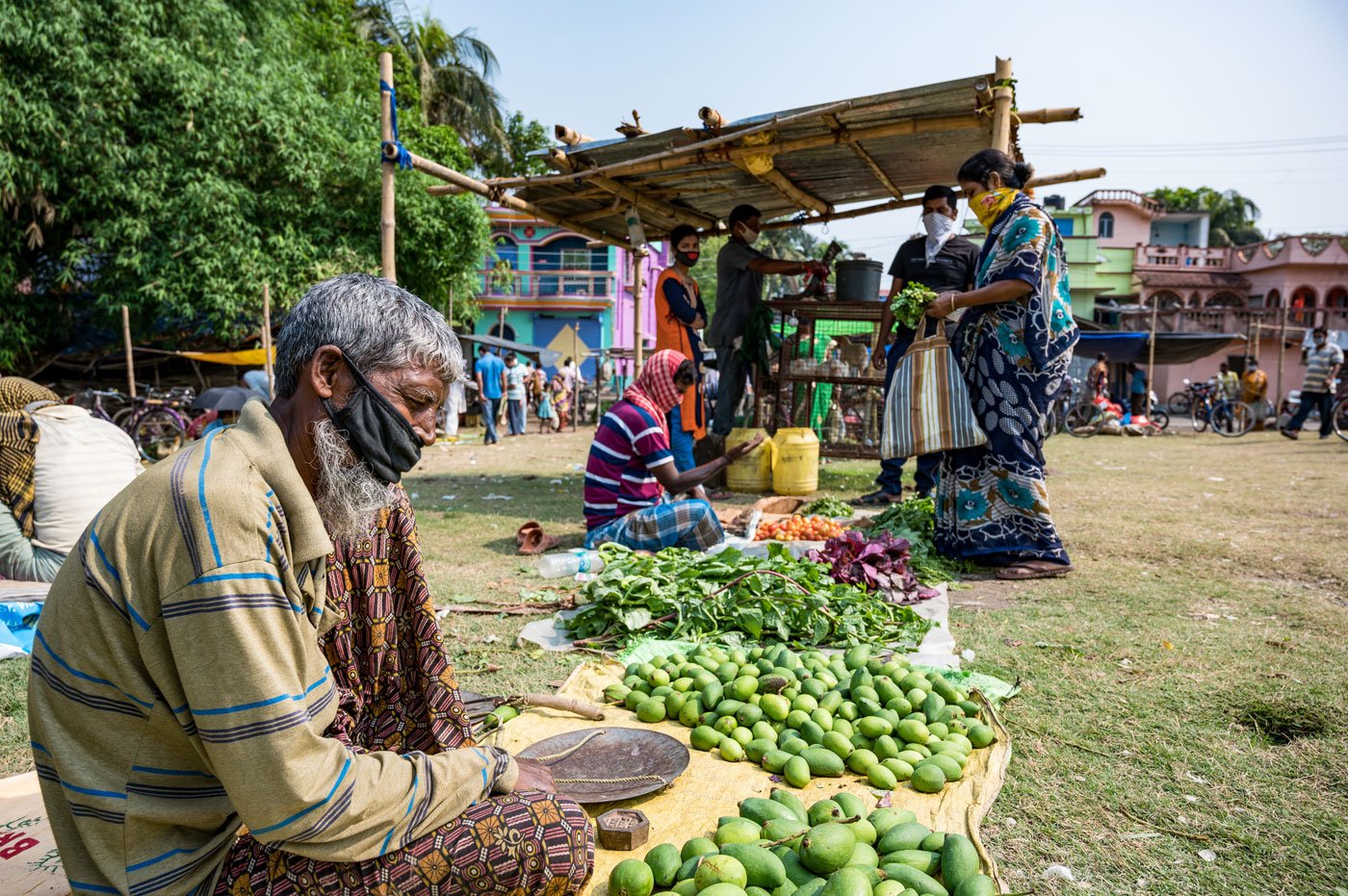
۵۶ سالہ سادھو شیخ کو میدان کے ٹھیک باہر، دوسرے سبزی فروش جہاں بیٹھے ہیں وہاں سے دور، ایک جگہ مل گئی ہے۔ وہ اپنے چھوٹے سے کھیت کے آم اور سبزیاں بیچ رہے ہیں۔
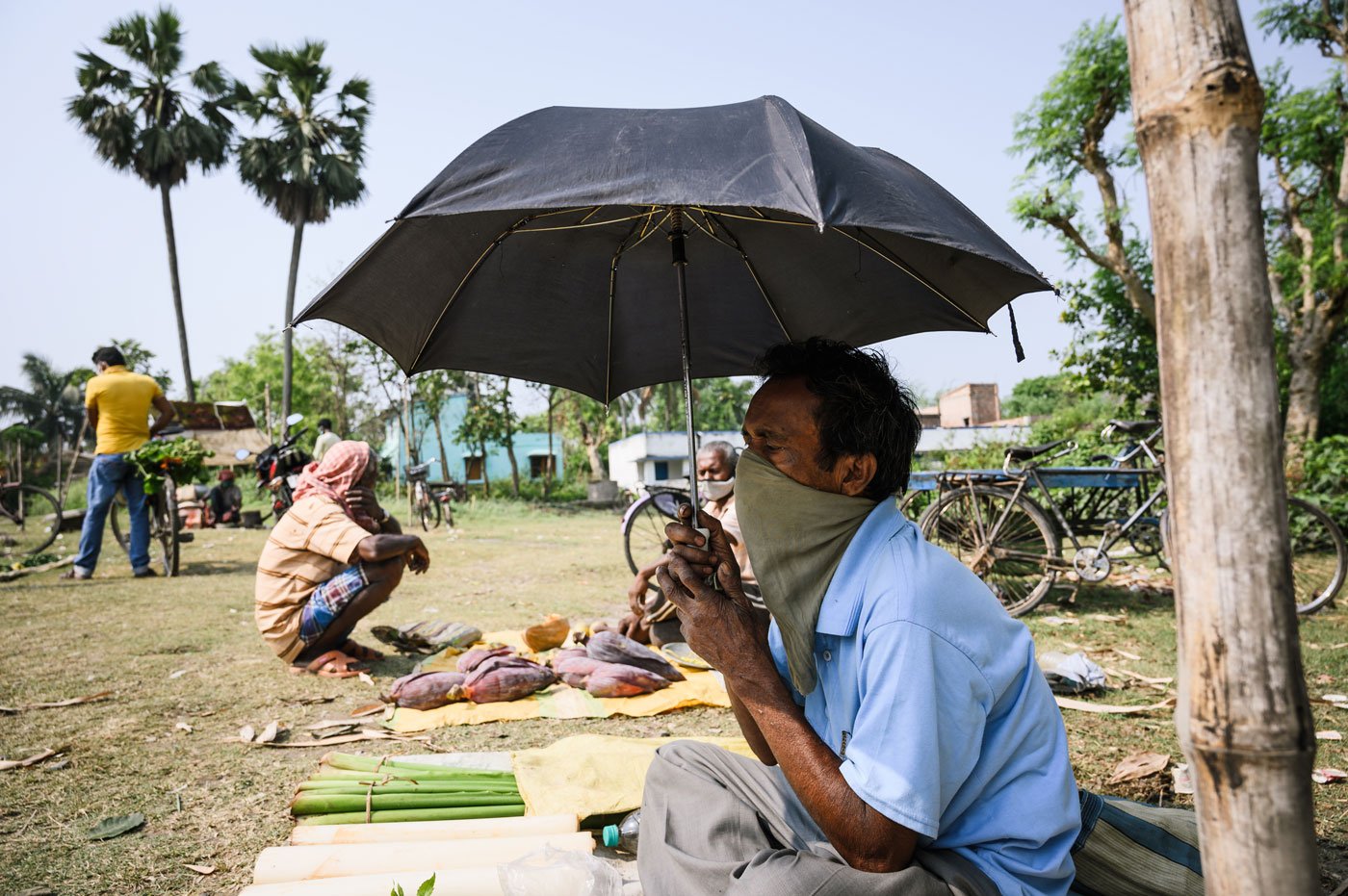
۵۸ سالہ سدانند رائے، سورج سے عارضی سایہ کے طور پر استعمال کرنے کے لیے پلاسٹک کی چادر کے بغیر، ایک چھاتا پکڑے سبزیوں کے ساتھ میدان کے بیچ میں بیٹھے ہیں۔ وہ دہلی میں گھریلو ملازم تھے، لیکن لاک ڈاؤن سے پہلے گھر آ گئے۔ ان کی واحد آمدنی اب کچھ سبزیاں بیچنے سے ہوتی ہے، جس سے انہیں روزانہ ۵۰-۱۰۰ روپے مل جاتے ہیں۔ ’’میں یہاں باقاعدگی کے ساتھ نہیں آ پایا کیوں کہ کبھی کبھی میرے پاس بیچنے کے لیے سبزیاں نہیں ہوتی ہیں،‘‘ وہ کہتے ہیں، ’’مجھے نہیں معلوم کہ مستقبل میں کیا ہوگا۔‘‘
مترجم: محمد قمر تبریز
